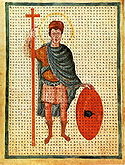Louis the Younger
| Louis the Younger | |
|---|---|
| King of Saxony | |
| Reign | 28 August 876 – 20 January 882 |
| Predecessor | Louis IIas King of East Francia |
| Successor | Charles III |
| King of Bavaria | |
| Reign | 22 March 880 – 20 January 882 |
| Predecessor | Carloman |
| Successor | Charles III |
| Born | 830 or 835 |
| Died | 20 January 882 Frankfurt,East Francia |
| Burial | |
| Spouse | Liutgard of Saxony |
| Issue | Hugh Louis Bernhard Hildegard |
| House | Carolingian |
| Father | Louis II |
| Mother | Emma of Altdorf |
Louis the Younger(830/835 – 20 January 882), sometimes calledLouis the Saxon[1][2]orLouis III,[3]was the second eldest of the three sons ofLouis the GermanandHemma.[4]He succeeded his father as the King of Eastern Francia on 28 August 876 and his elder brotherCarlomanasKing of Bavariafrom 879 to 882. He died in 882 and was succeeded in all his territories, which encompassed most ofEast Francia,by his younger brother,Charles the Fat,alreadyking of Italyandemperor.
Military youth[edit]
As a young man, Louis was deployed in military operations against theAbodritesto the east in 858 and 862.[5]In 854, at the invitation of the nobles ofAquitaineopposed toCharles the BaldandPepin II,and coaxed by his father and his cousinCharles, Archbishop of Mainz,he crossed into Gaul at the head of an army, intent on receiving the Aquitainian crown. He marched as far asLimogesbefore turning back.
Back home, Louis forged close ties with the nobles of East Francia and became increasingly independent from his father. He engaged himself to the daughter of Count Adalard and, in 865, he and his brother Charles joined in rebellion against their father. This flirtation with revolt was brief, however, and Louis, Charles, and their father were reconciled later that year, though the elder Louis was forced to make a division of the remainder of his territories between his two sons. Carloman had already been given thesubregulusofBavariain 864, now Louis receivedSaxony,Thuringia,andFranconiaand CharlesAlemanniaandRhaetia.
In 869, Louis marriedLiutgard,daughter ofLiudolf, Duke of Saxony,atAschaffenburg.Liutgard was a strong-willed and politically ambitious woman and later on spurred her husband to pursue ambitious goals. This match increased tensions between father and son and in 871 and in 873, Louis rebelled, but, on each occasion, he later reconciled with his father.
Rule in Saxony[edit]
Upon his father's death in 876, Louis fully inherited his subkingdoms, bearing the titlerex Francorum( "king of the Franks" ). Louis the Younger considered himself the true heir of Louis the German and as his father died in 876, Louis buried him in the abbey ofLorsch,in his own territories, in order to emphasise his primacy to his brothers. Louis also retained his father's chief advisor,Liutbert,Archbishop of Mainz.He and his brother ruled their kingdoms independently but cooperatively and never at war.
Acquisition of Lotharingia and Bavaria[edit]
Louis's rule was immediately threatened by Charles the Bald, who tried to annex the eastern parts ofLotharingiaand maybe even to achieve supremacy over his nephew. Louis brought war on Charles and, on 8 October 876 atAndernach,he defeated the much-larger host of West Francia. The East Frankish army displayed superiority in both unity and tactics, and the young king had even dressed his soldiers in white garments so that they appeared as an army of spirits.
After this victory, Louis the German's three sons met in November atNördlingento discuss the division of their father's kingdom and to have their hosts swear allegiance. According to the plan drawn up in 865, which their father, despite all his sons' rebellions, had confirmed in 872, Carloman received Bavaria, Charles Swabia, and Louis Saxony, Franconia, and Thuringia. Throughout his reign, though he is always called "King of Saxony" by historians, he never visited Saxony proper, though it formed the bulk of his territory. At the end of 877, the brothers assembled again to discuss the administration of their half of Lotharingia. After Carloman relinquished his claim, the realm was divided between Louis and Charles, who again met in September 878 inAlsatia.In 879, Carloman was incapacitated by a stroke and named Louis as his successor (and erstwhile regent) in Bavaria. Louis received it outright a year later when Carloman expired.
In November 878, after the death of Charles the Bald, his heir,Louis the Stammerer,and the latter's cousin Louis the Younger promised each other to respect the succession of their respective sons and to issue no claims contrary to that, atVoeren(FouronsinFrench). This Treaty of Fouron was soon put to the test, when Louis the Stammerer died in April 879. A party of western nobles led byAbbot Joscelininvited Louis the Younger to succeed to the rule of the western kingdom. Since his wife Liutgard also advocated heeding this call, Louis invaded West Francia. He marched as far asVerdun,but after the new kingsLouis IIIandCarlomanceded their part ofLotharingiato the invader, Louis retreated. In February 880, this gain was confirmed by theTreaty of Ribemont,signed nearSaint Quentin.This treaty determined the border of the two kingdoms, which was to remain unchanged until the fourteenth century.
Relationship with the nobility[edit]
In contrast to his father, Louis the Younger preferred reconciling royal interests with those of the nobility and avoided confrontation. He managed to bind powerful families to the king, including theLiudovingianrelatives of his wife, that later themselves became kings and emperors. Louis mostly stayed in theRhineland,avoiding Saxony or his eastern borders. Louis did visit Bavaria on two occasions, but mostly left it to the government of his illegitimate nephew, Carloman's son,Arnulf,Duke of Carinthia.[6]
Viking incursions[edit]
Since the summer of 879,Vikingshad been increasing their attacks on the Frankish kingdom and occasionally penetrated deeply into the interior of the land. Louis's kingdom was the most hard-hit after that of West Francia. In February 880, Louis confronted and defeated aNorsehost at theBattle of Thimeon(near modernCharleroi).[7]His son Hugh, however, was killed in this battle.[7]The next year,Louis III,King of West Francia, defeated theNorseat thebattle of Saucourt.[8]Louis the Younger also drove the Norse out of the royal palace ofNijmegen,which they had occupied. In the same month, a Saxon host commanded byDuke Bruno,the king's brother-in-law, suffered a heavy defeat nearHamburgand Bruno and many other Saxon nobles fell.
Death and succession[edit]
Louis fell sick in 881 and died inFrankfurton 20 January 882. He was buried beside his father in the abbey of Lorsch. By his wife Liutgard of Saxony, he had had a son called Louis (877–879), who died in a fall from a palace window, and a daughter called Hildegard (878–895). Louis had also fathered an illegitimate son, Hugh (855/60 – February 880), either with the daughter of Adalard or with an earlier concubine. Since he left no heir, all his territories fell to his brother Charles, who thus could reunite the entire East Frankish kingdom. Hildegard later joined with the Bavarian magnateEngeldeoin conspiring againstKing Arnulfand was deprived of her "public honours" in 895, according to theAnnals of Fulda.
Family[edit]
Louis the Younger marriedLiutgard of Saxony (died 885),a daughter of DukeLiudolf of Saxony,who was grandfather of KingHenry I of Germany.
- Louis(876 - November 879)
- Hildegard (875/878 or 881 - after 900)
- Bernhart
- Hugo(ca. 855/860 - February 880), illegitimate son[7]
- Adalhard, illegitimate son
See also[edit]
Notes[edit]
- ^Weinzierl, Eduard von (1877).Lehrbuch der allgemeinen Geschichte(in German). Austrian National Library. p. 110.
{{cite book}}:CS1 maint: location missing publisher (link) - ^Bradshaw, George(1867).Illustrated hand-book to Germany.London. pp. xxi.
{{cite book}}:CS1 maint: location missing publisher (link) - ^Louis the PiousandLouis the Germanwould be Louis I and Louis II, respectively, in this numbering. If counted as "Louis III of Germany," he should not be confused withLouis III, Holy Roman Emperor,orLouis the Child.
- ^McKitterick 1999,p. 354.
- ^Reuter, 72.
- ^As "prefect of the marches." Bowlus, 569.
- ^abcMcKitterick 1995,p. 234-235.
- ^McKitterick 1999,p. 235.
Sources[edit]
- Oman, Charles.The Dark Ages 476–918.London: Rivingtons, 1914.
- McKitterick, Rosamond (1995).The Carolingians and the Written Word.Cambridge University Press.
- McKitterick, Rosamond (1999).The Frankish Kingdoms under the Carolingians.Pearson Education Limited.
- Bowlus, Charles R. "Imre Boba's Reconsiderations of Moravia's Early History and Arnulf of Carinthia's Ostpolitik (887-892).Speculum,Vol. 62, No. 3. (Jul., 1987), pp 552–574.
- Reuter, Timothy.Germany in the Early Middle Ages, c. 800–1056.Longman, 1991.
- Annales Fuldensestranslated by Timothy Reuter, with commentary (subscription needed).
External links[edit]
- The Dissolution of the Frankish Empire at Historical Atlas.Good for maps of Louis's realm and his brothers'.




